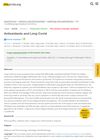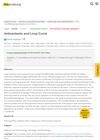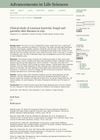 September 2023 in “Biomedicines”
September 2023 in “Biomedicines” Squalene may be a marker for certain types of alopecia.
99 citations,
January 2004 in “Progress in brain research” Neurotrophins are important for hair growth and could help treat hair loss.
42 citations,
July 2013 in “Gene” IL-4 gene variation may increase the risk of alopecia areata in Turkish people.
40 citations,
July 2015 in “Kidney International” IL-3 worsens lupus nephritis and blocking it improves kidney health.
29 citations,
April 2000 in “Journal of histochemistry and cytochemistry/The journal of histochemistry and cytochemistry” ICAM-1 helps regulate hair growth cycles and skin remodeling.
18 citations,
August 2013 in “Journal of Feline Medicine and Surgery” Cats can get skin issues from things other than fleas, like insect bites, food, or allergens.
 15 citations,
October 2021 in “Frontiers in Pharmacology”
15 citations,
October 2021 in “Frontiers in Pharmacology” Natural volatiles and essential oils have health benefits and can enhance the effects of some medicines, but more research is needed to understand how they work and their possible side effects.
 15 citations,
March 2020 in “Experimental and Therapeutic Medicine”
15 citations,
March 2020 in “Experimental and Therapeutic Medicine” The skin is a large organ that plays a role in the immune system.
 12 citations,
April 2020 in “British Journal of Dermatology”
12 citations,
April 2020 in “British Journal of Dermatology” Caffeine may help reduce stress-induced hair loss.
 6 citations,
December 2019 in “BMC Complementary and Alternative Medicine”
6 citations,
December 2019 in “BMC Complementary and Alternative Medicine” Alcohol extract from Vernonia anthelmintica seeds may help treat stress-related hair loss.
 4 citations,
January 2019 in “Annals of Dermatology”
4 citations,
January 2019 in “Annals of Dermatology” RE-ORGA, a Korean herb extract, may help prevent hair loss.
4 citations,
September 2015 in “JAAD case reports” Substance P may play a role in the inflammation seen in keratosis follicularis spinulosa decalvans.
3 citations,
August 2022 in “International Journal of Molecular Sciences” COVID-19 can cause hair loss, and treatments like PRP and stem cells might help.
 3 citations,
May 2022 in “The journal of investigative dermatology/Journal of investigative dermatology”
3 citations,
May 2022 in “The journal of investigative dermatology/Journal of investigative dermatology” Skin lesions in Carney Complex are caused by a gene change in some skin cells that leads to increased pigmentation and may lead to tumors.
1 citations,
December 2023 in “Life” PRP helps skin heal, possibly through special cells called telocytes.
 1 citations,
October 2022
1 citations,
October 2022 Antioxidants might help manage Long Covid by addressing oxidative stress and nutrient imbalances.
 1 citations,
October 2022
1 citations,
October 2022 The conclusion suggests that managing antioxidant levels and the calcium to magnesium ratio may help address Long Covid and related chronic fatigue conditions.
 July 2024 in “Advancements in Life Sciences”
July 2024 in “Advancements in Life Sciences” Fungal infections are the most common skin disease in cats, especially white ones.
 April 2024 in “Skin appendage disorders”
April 2024 in “Skin appendage disorders” Environmental pollutants can damage hair health and cause hair loss.
 October 2023 in “Naunyn-Schmiedeberg's Archives of Pharmacology”
October 2023 in “Naunyn-Schmiedeberg's Archives of Pharmacology” Custom software found that common allergy drugs might have new uses for various conditions and could improve survival in some cancers.
 November 2022 in “Skin health and disease”
November 2022 in “Skin health and disease” People with hair loss conditions often have more mental health issues like depression and anxiety compared to those without hair loss.
May 2020 in “The journal of investigative dermatology/Journal of investigative dermatology” BIVV009 is a safe treatment for bullous pemphigoid that reduces C3 deposition without harmful side effects.
April 2017 in “Al-Azhar Medical Journal” PRP is an effective and safe treatment for alopecia areata.
Rosemary oil effectively promotes hair growth in mice.
 March 2009 in “Journal of Biomedical Research”
March 2009 in “Journal of Biomedical Research” Herbal extract mixtures may speed up hair growth and could help treat baldness.
April 2003 in “Journal of Clinical Dermatology” 355 citations,
January 2017 in “Journal of the American Academy of Dermatology” JAK inhibitors show promise for treating skin conditions like eczema, hair loss, and psoriasis.
179 citations,
June 2000 in “The American journal of pathology” The absence of functional sebaceous glands causes hair follicle destruction and scarring alopecia.
 146 citations,
January 2004 in “Hormones”
146 citations,
January 2004 in “Hormones” Human skin acts like a hormone-producing organ, making and managing various hormones important for skin and hair health.
69 citations,
May 2009 in “Journal of Investigative Dermatology” Stress might contribute to hair loss in alopecia areata.















